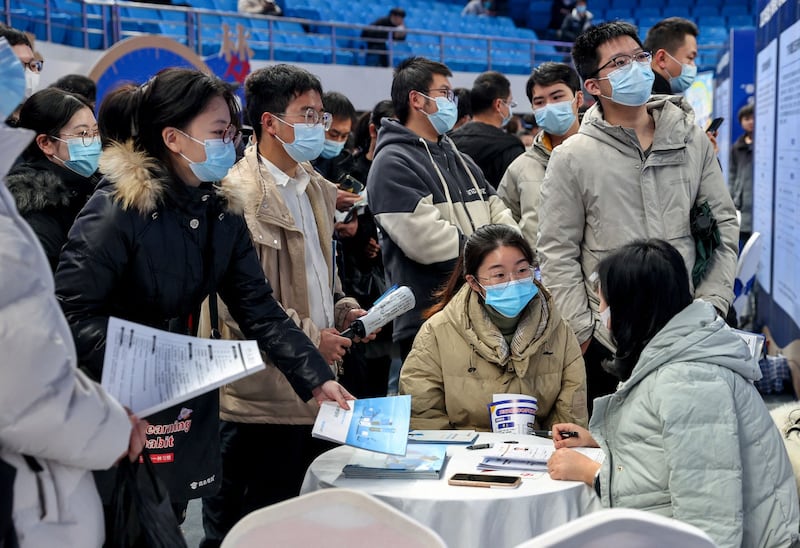When China put an end to the grueling lockdowns, mass testing and compulsory quarantines of the zero-COVID era, most people were hoping life would get back to normal.
But a local government debt crisis, weak domestic demand and the collapse of property prices have left the economy in poor shape. At the same time, unemployment among young people has hit a five-year high.
According to official data released in April, 20.4% of job seekers between the ages of 16 and 24 are unemployed.
Added to all of that, there is the "Curse of 35."
Recruitment ads these days often call for candidates under 35, and the age barrier has become yet another ceiling on the aspirations of people who only want the chance to make a living.
The current labor market also makes it much harder for people who want to settle down and start a family.
Uncompensated OT
Age discrimination has been worsening in China for some time now, as companies seek younger employees willing to work large amounts of uncompensated overtime under the 996 system -- working from 9.00 a.m. to 9.00 p.m., Monday to Saturday.
Much of the demand for excessive overtime comes from the tech sector, according to a 39-year-old former Huawei employee who gave only the nickname Emma, for fear of reprisals.
"The internet industry has developed rapidly in mainland China over the past 10 years," she said. "It's an industry that has heavy overtime requirements, so it often discriminates against older people."

That includes global tech giants like Huawei, where she used to work.
"Shortly after I started working there, Huawei would regularly lay off older employees," Emma said.
But the "Curse of 35" only started to become widely noticeable in recent years, as economic growth has slowed, she said.
"Age discrimination in the job market is now very severe, and there are also various kinds of invisible discrimination at work, such as assumptions about whether you plan to marry and have kids," Emma said.
This means that many young people are afraid to leave jobs once they have them, for fear of never finding another.
Civil service exams
A 34-year-old employee of a culture-related state-owned enterprise who gave only the surname Chen said he counts himself among their number.
"I've managed to hang onto this job for five years, and I haven't once thought about jumping ship," Chen said. "The labor market has gotten much tougher due to the pandemic, and I'm also nearly 35, nearly at that threshold, and I'll be much less able to compete within it."
"I've seen that a lot of companies basically want to hire young people, fresh graduates, or people with a few years' experience," he said. "A lot of my friends are in a similar situation."
Chen agrees that 35 has become something of a magic number in the labor market because it's the upper age limit for candidates wanting to sit exams to enter the civil service, thereby gaining a foothold in "the system" of Communist Party officialdom, which offers healthcare, a pension and which can lead to wealth and power.
Anyone under that age still has this option open to them, so employees under the age of 35 can still view the civil service as a backup plan, in case they can't stand their jobs any more. As soon as they hit 35, that option is no longer there, he said.
Companies know this too, so the threshold affects what they are willing to pay younger employees.
"I have friends who have gone for interviews at this age, and their salaries have basically been cut in half," Chen said.
Chen, who describes his job as "labor-intensive," is competing with people just out of college, who have far more strength and resilience than older employees can offer.
"Basically, all of the professional knowledge and management experience that someone of 35 has been able to accumulate isn't valued at all," he said. "Younger people who are new to the labor market can put in more hours, so companies prefer to hire them.”
Marriage and family?
When work is that precarious, it's hard to even think about starting a family, Chen said.
"Insecure work means an unstable income, and worse prospects for the future," he said. "This means that marriage and children are off the agenda."

The worries about ageism in the Chinese workplace are leading many young people to " run" to the United States in search of jobs.
A 25-year-old Seattle-based student who gave only the surname Wang said she wants to stay in the United States after graduation because she fears being discriminated against in the Chinese job market.
"I heard a lot of stories about age discrimination [in China] after I graduated college, even though I was only 22 at the time," Wang said. "For example, internet companies undergo optimization of the workforce, which means layoffs, once they reach 35.”
"Originally, I wanted to apply to the civil service or government agencies, but some positions state very clearly that there are upper age limits of 25 or 30 years old,” she said. "And as a woman, I felt the problem of age discrimination was even more acute.”
"I chose to study and work in the United States because I didn't want to be discriminated against and I wanted a healthier work environment," Wang said.
Weak labor laws
High unemployment and weak labor laws are also to blame for ageism, she said.
“With such a large population, China has an oversupply of labor," she said. "And demand for labor has fallen, particularly during the pandemic, when the economy slowed."
"That has led to a basic lack of respect for workers, because there is a never-ending stream of younger people waiting to replace workers over 35," she said. "[There is also] a lack of legal channels through which employees can defend their rights and interests,"
"When they are discriminated against, they often have to swallow their anger and put up with it,” Wang said.
A 37-year-old job-seeker from the eastern city of Hangzhou who gave only the surname Ge, said he has been through this himself.
"I was unemployed for a time at the end of 2021, which was still during the zero-COVID policy," he said. "The first issue I faced was my age."
Ge said he was told point-blank by human resources departments that this was a factor working against his application.
"They also weren't shy about asking me about my financial situation, whether or not I had a mortgage, and whether or not having a family life was in the cards," he said.
Cheaper and easier
But why do Chinese employers prefer fresh graduates over experienced employees?
Hua Haifeng, an investigator with the U.S.-based rights group China Labor Watch, said it's because they are cheaper and easier to manage.
"They may not be able to pay [people over 35] what they need, and young people are more manageable because of their lack of experience," Hua said. "Especially when it comes to regular jobs in industries like manufacturing -- they are far more likely to hire younger people," he said.
He said employers are able to pick and choose due to high unemployment rates and the economic downturn.
"Problems like this did occur before, but there were more jobs back then, and [ageist discrimination] has become far more obvious now," Hua said. "There used to be far greater demand for labor, and companies couldn't afford to be too picky, or to place too many limits on their workforce."
Independent economist Qin Weiping said the structural changes are affecting people's plans to marry and raise children, a key aim of the ruling Chinese Communist Party amid an aging and shrinking population.
"Young people under the age of 35 are easier to manage because they lack social experience and it's easier for companies to force them to work overtime," Qin said.
Translated by Luisetta Mudie. Additional reporting by Sun Cheng, Wang Yun, and Kai Di. Edited by Malcolm Foster.
